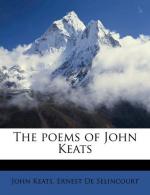|
This section contains 19,540 words (approx. 66 pages at 300 words per page) |

|
SOURCE: "Keats and the Historical Method in Literary Criticism," in Modern Language Notes, Vol. 94, No. 5, December, 1979, pp. 988-1032.
In the following essay, McGann first reviews the principles of historical literary analysis and then argues for the significance and necessity of using the historical approach in studying Keats's work, despite the "virtually unanimous decision of Western literary critics " that historical analysis is irrelevant to the understanding of Keats's poetry.
Conflicts between formal or stylistic analysis and historical scholarship are a traditional problem in literary studies. In the field of hermeneutics, where the lines of disagreement tend to sharpen, the best commentators—Lionel Trilling, for example—have generally aimed for, and achieved, various pragmatic agreements. Few critics would take seriously any suggestion that Byron's poetry could be adequately interpreted without bringing a fair amount of historical and biographical information to bear.1 On the other hand, a text-only approach has been...
|
This section contains 19,540 words (approx. 66 pages at 300 words per page) |

|


